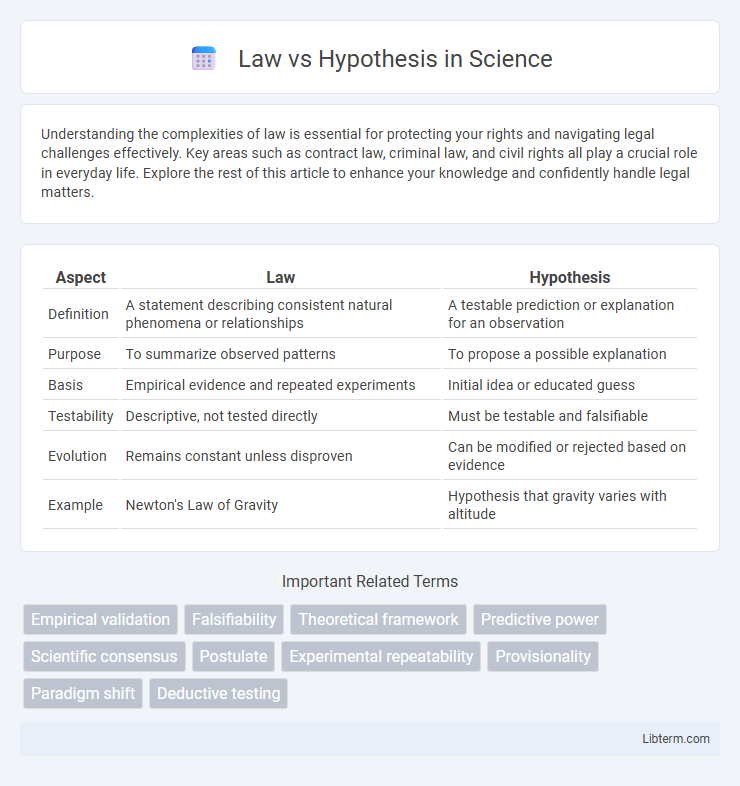Understanding the complexities of law is essential for protecting your rights and navigating legal challenges effectively. Key areas such as contract law, criminal law, and civil rights all play a crucial role in everyday life. Explore the rest of this article to enhance your knowledge and confidently handle legal matters.
Table of Comparison
| Aspect | Law | Hypothesis |
|---|---|---|
| Definition | A statement describing consistent natural phenomena or relationships | A testable prediction or explanation for an observation |
| Purpose | To summarize observed patterns | To propose a possible explanation |
| Basis | Empirical evidence and repeated experiments | Initial idea or educated guess |
| Testability | Descriptive, not tested directly | Must be testable and falsifiable |
| Evolution | Remains constant unless disproven | Can be modified or rejected based on evidence |
| Example | Newton's Law of Gravity | Hypothesis that gravity varies with altitude |
Defining Scientific Laws
Scientific laws are concise, universally accepted descriptions of natural phenomena, derived from repeated experimental observations and empirical evidence. Unlike hypotheses, which are testable predictions requiring verification, laws summarize established facts without explaining underlying mechanisms. These laws provide reliable frameworks to predict outcomes under specific conditions, serving as foundational principles in various scientific disciplines.
Understanding Hypotheses
A hypothesis is a testable prediction that explains a phenomenon and guides scientific investigation, differing from a law that describes consistent natural patterns without explaining why. Understanding hypotheses involves formulating clear, specific, and falsifiable statements that can be experimentally verified or refuted. Hypotheses drive research by providing a framework for experiments, data collection, and analysis, which may eventually contribute to developing broader scientific theories or laws.
Key Differences Between Laws and Hypotheses
Laws describe consistent, universal phenomena or relationships observed in nature, often expressed mathematically, whereas hypotheses are testable predictions or explanations formulated for specific questions or experiments. Laws are established based on repeated experimental observations and have broad applicability, while hypotheses require further testing and validation to be accepted. Unlike laws, hypotheses can be disproven or modified as new evidence emerges.
Formation Process: Law vs Hypothesis
Laws are formed through repeated observations and empirical evidence confirming consistent natural phenomena, resulting in concise, universally accepted statements. Hypotheses originate as testable predictions or explanations based on limited data, designed to be rigorously tested through experimentation. The formation of laws involves extensive validation and reproducibility, whereas hypotheses serve as initial steps in the scientific method that require refinement or rejection based on experimental results.
Role in the Scientific Method
Laws describe consistently observed natural phenomena, providing concise, universal statements based on empirical evidence, while hypotheses are testable predictions formulated to explore and explain these phenomena. In the scientific method, hypotheses serve as the starting point for experimentation and data collection, guiding researchers to validate or refute assumptions. Laws emerge from repeated validation of hypotheses and extensive empirical research, representing established scientific principles.
Examples of Scientific Laws
Newton's Law of Universal Gravitation explains the attractive force between two masses as proportional to their product and inversely proportional to the square of the distance between them. Boyle's Law describes the inverse relationship between pressure and volume of a gas at constant temperature, forming a key principle in thermodynamics. Ohm's Law quantifies the direct proportionality between voltage, current, and resistance in an electrical circuit, serving as a foundational concept in physics and engineering.
Examples of Scientific Hypotheses
Scientific hypotheses often arise as tentative explanations for observed phenomena, such as Darwin's hypothesis on natural selection explaining species adaptation or Mendel's hypothesis on genetic inheritance predicting trait transmission. Unlike laws, which describe consistent relationships like Newton's law of universal gravitation predicting gravitational force, hypotheses require experimental testing and can be revised or discarded based on evidence. Examples also include the ozone depletion hypothesis, which suggested that chlorofluorocarbons cause atmospheric damage and led to targeted environmental policies after empirical validation.
Testing and Validation Procedures
Scientific laws are validated through extensive empirical testing and consistent reproducibility of results under various conditions, establishing their reliability and universality. Hypotheses require rigorous experimental procedures designed to test specific predictions, involving controlled variables and statistical analysis to confirm or refute the proposed explanation. Validation of laws involves repeated confirmation across multiple studies, while hypotheses demand iterative testing and refinement to evolve into well-supported scientific theories or laws.
Misconceptions About Laws and Hypotheses
Laws and hypotheses are often misunderstood, with many believing laws are absolute truths while hypotheses are mere guesses. In reality, scientific laws describe consistent natural phenomena without explaining why they occur, whereas hypotheses are testable predictions that can evolve or be disproven. Misconceptions arise when laws are seen as unchangeable facts and hypotheses as weak assumptions, ignoring their respective roles in the scientific method.
Importance in Scientific Research
Scientific laws provide consistent, universally accepted descriptions of natural phenomena based on extensive empirical evidence, while hypotheses serve as testable predictions guiding experimental research. The importance of hypotheses lies in their ability to drive scientific inquiry, enabling researchers to explore unknown aspects and validate or refine existing theories. Laws establish foundational truths that support scientific progress and technology development, ensuring reliable and reproducible results across studies.
Law Infographic

 libterm.com
libterm.com